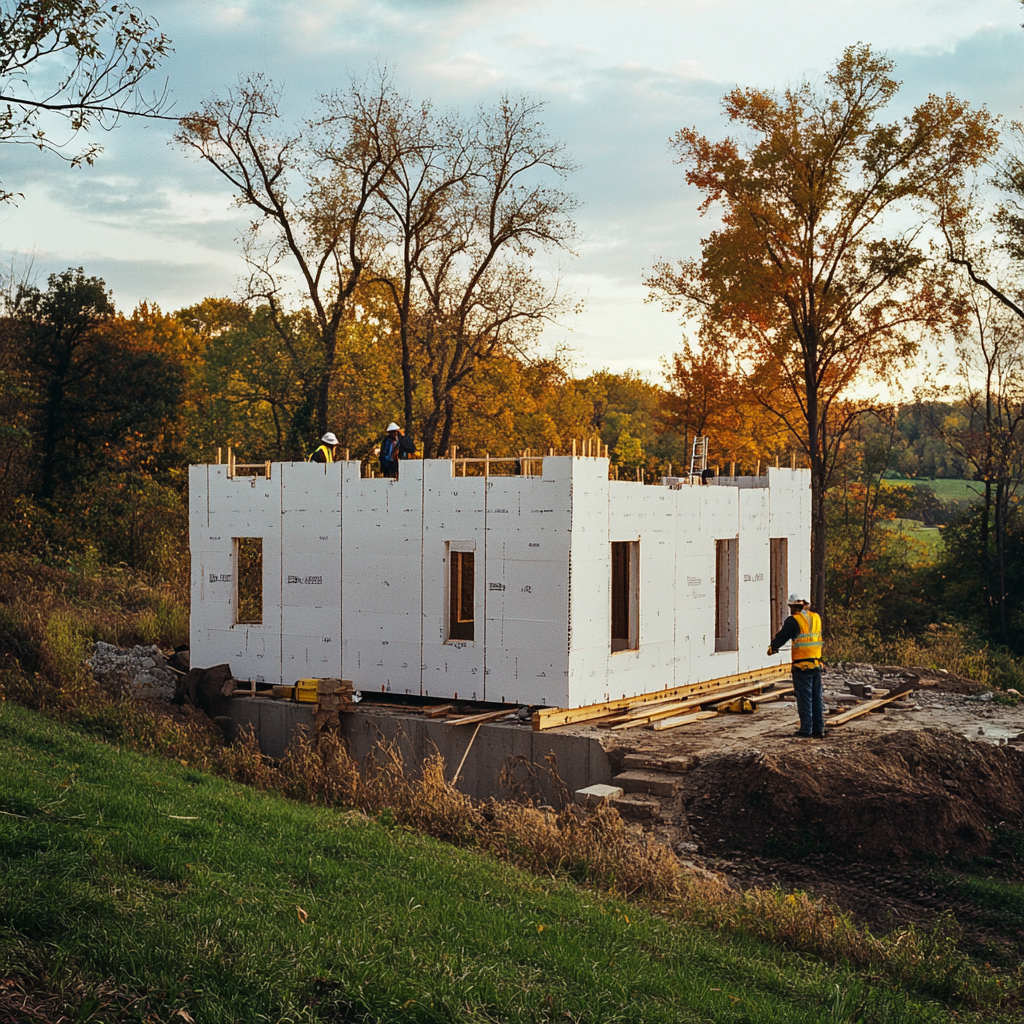When it comes to building a home that prioritizes health, comfort, and sustainability, every material choice matters. One of the most critical decisions is the selection of the structural system that forms the backbone of your home. At GoldenLeaf Manor, we’ve chosen Insulated Concrete Forms (ICFs) for this very reason. But what makes ICFs the superior choice for building a healthy home? Let’s delve into the unique benefits of ICFs and how they contribute to creating an environment that supports well-being and longevity.
1. Superior Air Quality: Creating a Clean and Safe Environment
Indoor air quality is a cornerstone of a healthy home. Poor air quality can lead to a range of health issues, from allergies and asthma to more severe respiratory problems. One of the key advantages of ICF construction is its ability to create a nearly airtight seal around the home. This tight envelope significantly reduces the infiltration of outdoor pollutants, allergens, and pests, which are common culprits in compromising indoor air quality.
How ICFs Work:
ICFs consist of hollow blocks made from insulating foam, which are stacked and filled with concrete. Once set, they form a solid, continuous barrier that blocks outside air from seeping in and inside air from leaking out. This barrier is critical in controlling the indoor environment, ensuring that the air you breathe is free from external contaminants.
2. Moisture and Mold Resistance: Protecting Your Health
Mold is more than just an eyesore—it’s a serious health hazard. Exposure to mold can trigger allergic reactions, asthma, and other respiratory issues. Mold thrives in environments where moisture is uncontrolled, making it crucial to choose construction materials that can manage humidity effectively.
Why ICFs Are Ideal:
ICFs naturally resist moisture infiltration due to their airtight construction. This reduces the likelihood of water getting trapped within the walls, a common issue with traditional wood-frame construction. By keeping moisture out, ICFs help prevent the conditions that allow mold to grow, protecting both the structure of your home and the health of its occupants.
Additionally, ICFs maintain consistent indoor humidity levels, further preventing the development of mold and mildew. This is particularly important in regions like Georgia, where high humidity can be a persistent issue.
3. Energy Efficiency and Comfort: Enhancing Well-Being
Energy efficiency might seem like an environmental concern, but it’s also directly linked to health. Homes that maintain stable temperatures with minimal energy input create a more comfortable and healthier living environment. Fluctuations in indoor temperature can stress the body, leading to discomfort and potential health risks, especially for vulnerable populations such as the elderly or those with chronic conditions.
**ICFs and Thermal Performance:**
The superior insulation provided by ICFs ensures that your home remains at a consistent temperature year-round. The insulating foam blocks used in ICF construction offer a high R-value (a measure of thermal resistance), keeping the home warm in the winter and cool in the summer. This not only reduces the need for excessive heating and cooling, lowering energy bills, but also contributes to a stable and comfortable indoor environment that supports health and well-being.
4. Durability and Safety: Ensuring Long-Term Health
A healthy home isn’t just about immediate comfort—it’s about long-term safety and durability. Homes built with ICFs are known for their strength and resilience, particularly in the face of natural disasters such as hurricanes, tornadoes, and earthquakes. This level of durability not only protects the physical structure but also the well-being of its occupants.
The Strength of ICFs:
Concrete, the core material in ICFs, is one of the strongest building materials available. It can withstand extreme weather conditions far better than traditional wood framing. This means that in the event of a natural disaster, the home is more likely to remain intact, protecting its occupants from injury and ensuring that the indoor environment remains safe and habitable.
5. Noise Reduction: A Quieter, Healthier Home
Noise pollution is an often-overlooked factor in home health, but it can significantly impact mental well-being. Excessive noise can lead to stress, sleep disturbances, and even cardiovascular problems over time. ICFs provide excellent sound insulation due to their dense construction, reducing the transmission of noise from outside and creating a quieter, more peaceful indoor environment.
How ICFs Mitigate Noise:
The combination of foam insulation and concrete in ICFs creates a barrier that significantly reduces sound transmission. This is particularly beneficial for homes located in busy areas or near highways, where outside noise can be a constant disturbance. By blocking out unwanted noise, ICFs help to create a calm and restful environment that supports mental health and well-being.
Conclusion: Building for Health and Longevity
Choosing Insulated Concrete Forms (ICFs) for your home’s construction is more than just a smart building decision—it’s a commitment to health, safety, and long-term well-being. From superior air quality and mold resistance to enhanced energy efficiency and structural durability, ICFs offer a comprehensive solution for creating a home that truly supports a healthy lifestyle.
At GoldenLeaf Manor, we believe that a home should do more than provide shelter; it should actively contribute to the health and happiness of those who live there. That’s why we’ve chosen ICFs as the foundation of what we believe will be Georgia’s healthiest home. Stay tuned as we continue to explore the many ways we’re building a future where health and sustainability go hand in hand.
By choosing ICFs, we’re not just building a house—we’re building a legacy of health, comfort, and resilience that will stand the test of time.

